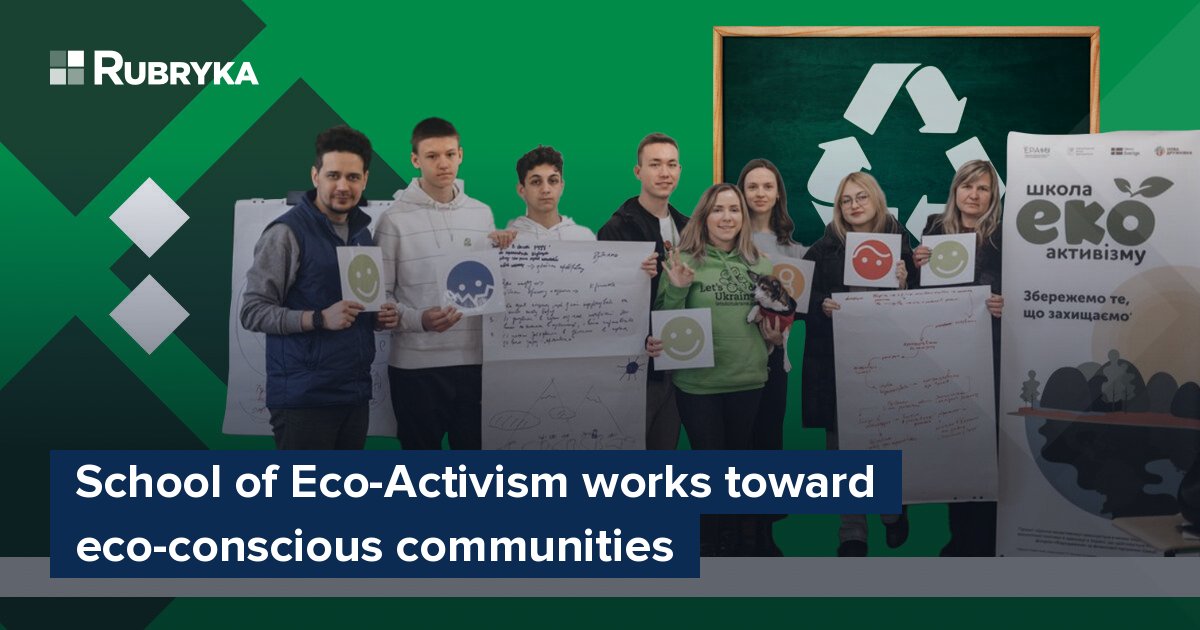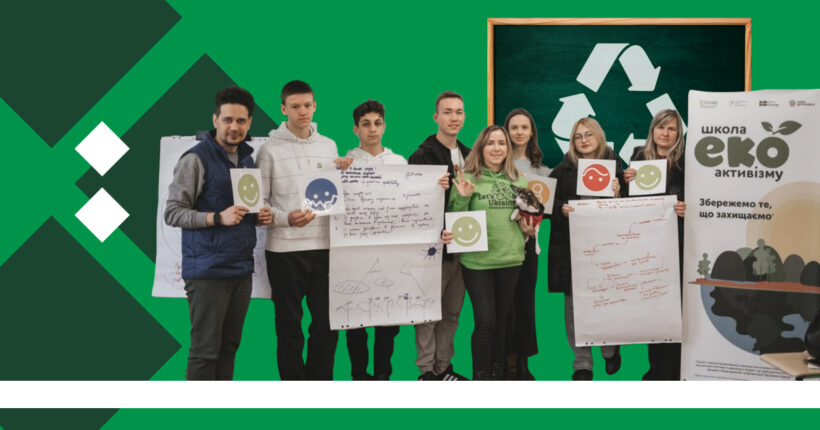
What is the problem?
The issue of environmental restoration will become one of the most pronounced issues to face in post-war Ukraine. According to the Ministry of Environmental Protection and Natural Resources of Ukraine, environmental damage due to the war has already exceeded $38 billion. These figures are only a preliminary estimate because ecologists cannot access occupied and front-line territories. The war is still ongoing, but now is the time to start thinking about and planning how to improve Ukraine's environment after the end of hostilities.
What is the solution?
During the war, New Druzhkivka initiated the opening of eco-activism schools in two communities in the Kirovohrad region. Rubryka spoke with Anna Pavlenko, head of the School of Eco-Activism, about their curriculum and why it is necessary to teach eco-consciousness.

New Druzhkivka initiated the opening of eco-activism schools in two communities in the Kirovohrad region
New Druzhkivka has been working in the Donetsk region in Ukraine's east since 2016. Before the war, the members of the NGO were actively engaged in community safety, development and urbanism. Together with residents of communities, the organization implemented educational, cultural, informational, and infrastructure projects seeking solutions to local problems. In November 2022, part of the team moved to Kropyvnytskyi in central Ukraine, where it began expanding the geography and focus of its projects.
The idea to create a School of Eco-Activism arose due to new challenges the New Druzhkivka team faced during a large-scale war. "We understand how critical the environmental situation is in our country. It is vital to plan now how we will rebuild Ukraine after victory," says Anna Pavlenko, the head of the school. Today it is necessary to start studying modern environmentally-friendly approaches to eventually attract all the resources to preserve and restore our country as much as possible."
She notes that they decided to involve young people in eco-activism training because they see the youth as the drivers of change. The cities of Oleksandria and Znamyanka in the Kirovohrad region were chosen to implement the project, supported by the International Renaissance Foundation.
How does it work?
What is the School of Eco-Activism

The cities of Oleksandria and Znamyanka in the Kirovohrad region were chosen to implement the project
Training at the School of Eco-Activism runs for five months, during which students will undergo training with experienced environmental specialists and activists.
Pavlenko explains the concept of the School of Eco-Activism as pushing for innovative solutions. "We don't just want to teach the participants to sort garbage. We want to provide an understanding of what alternatives already exist and encourage them to look for new ones."
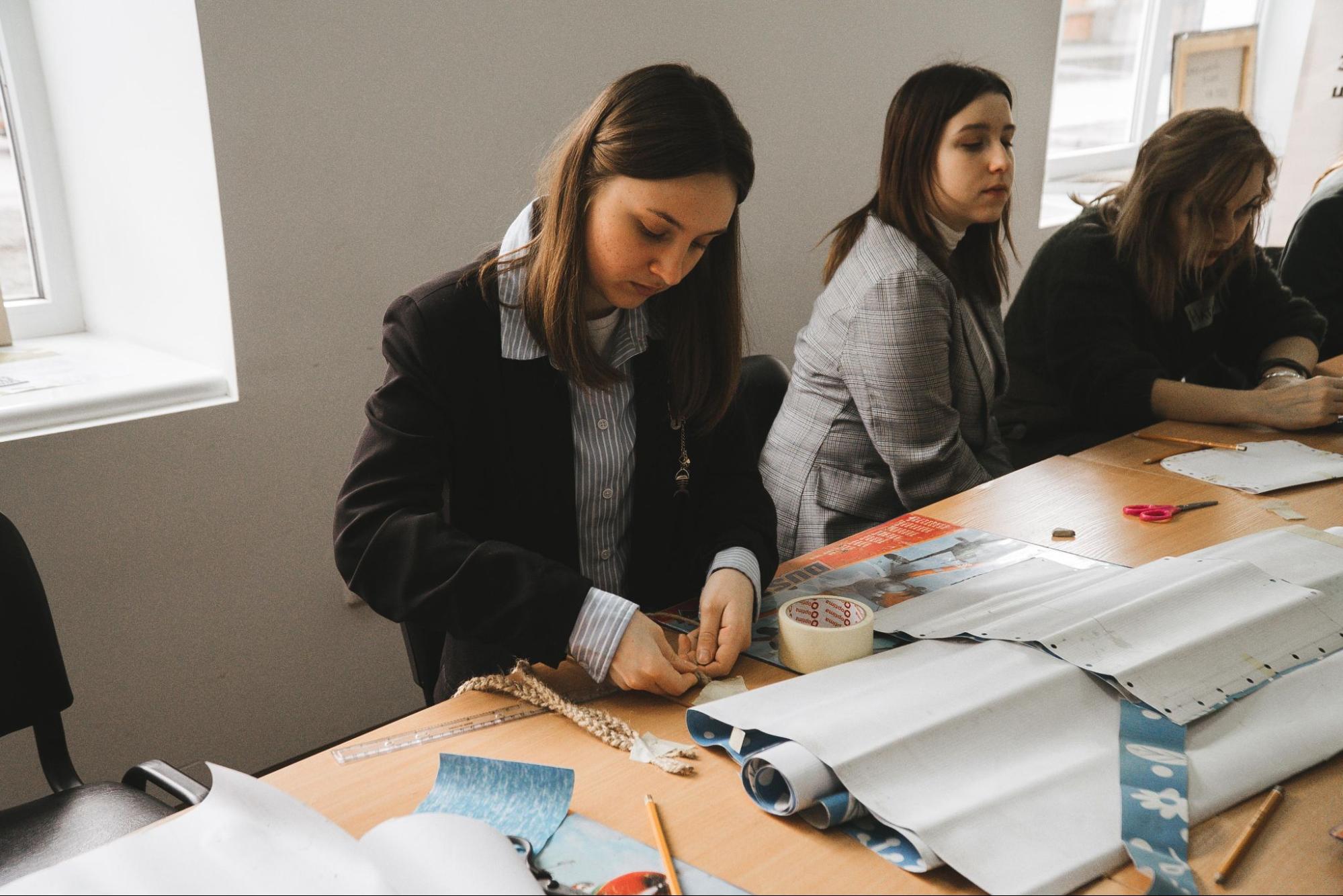
The school teaches youth to look for eco-friendly solutions.
For example, "Reuse" is an important practice taught, to repurposing items for other functions. One of the classes teaches the disposal of non-recyclable advertising banners — the students decided to give new meanings to the used banners by turning them into shopping bags.
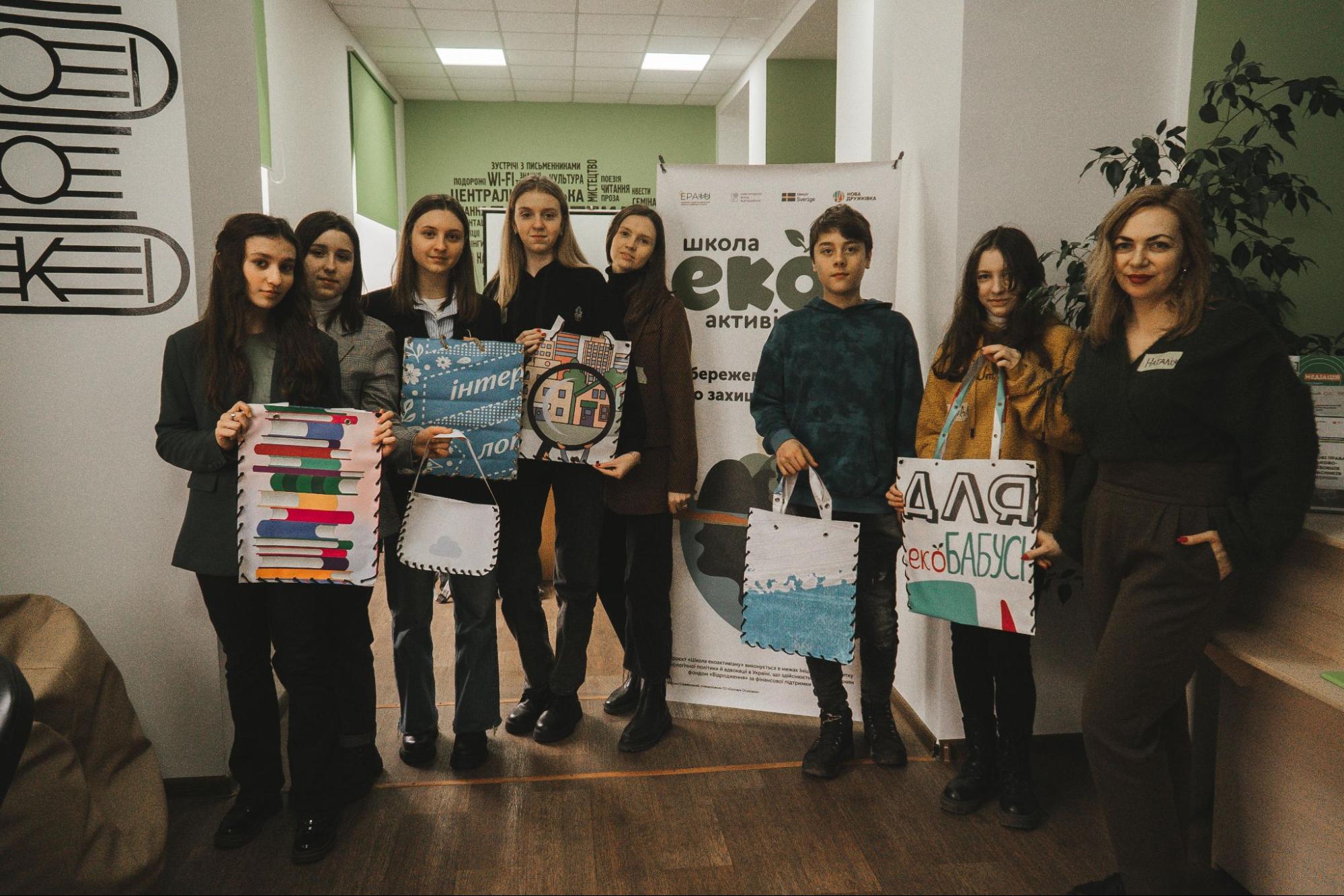
Hand-made bags are a great alternative to store-bought ones
The banner is made of very stiff material, which is difficult to sew by hand. But the school's trainer, fashion designer Nataliia Grachykova, came up with the idea of connecting the parts with the help of hooks and laces. Hand-made bags are a vivid illustration of how reuse can reduce waste.
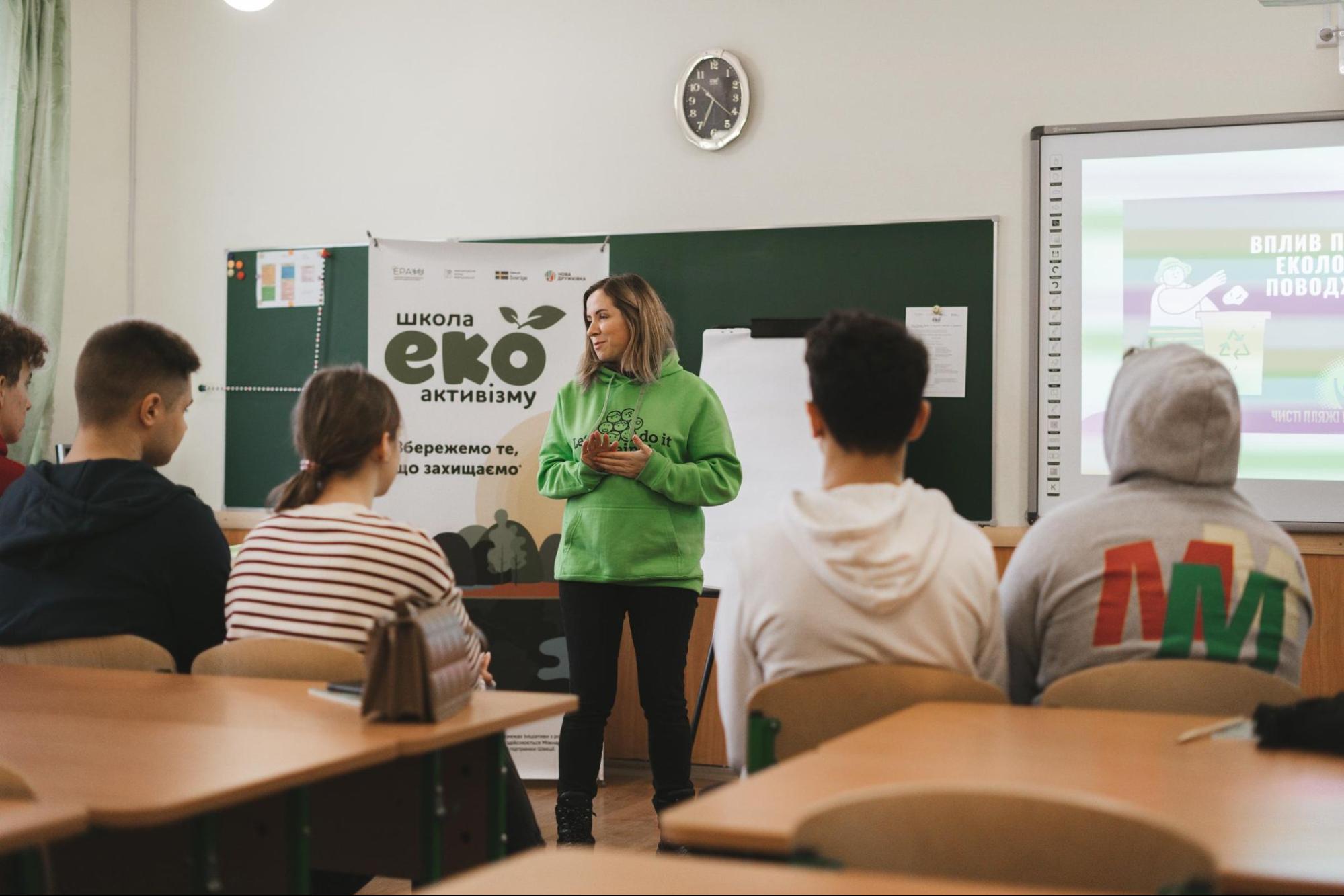
Yulia Markhel, the leader of Ukraine's largest eco-movement, "Let's do it, Ukraine," conducted training for school students
Yulia Markhel, the leader of Ukraine's largest eco-movement, "Let's do it, Ukraine," conducted training for school students on the responsible handling of household waste. Together with local expert Iryna Muntyan, young people conducted water quality testing and created a carbon filter for its purification.
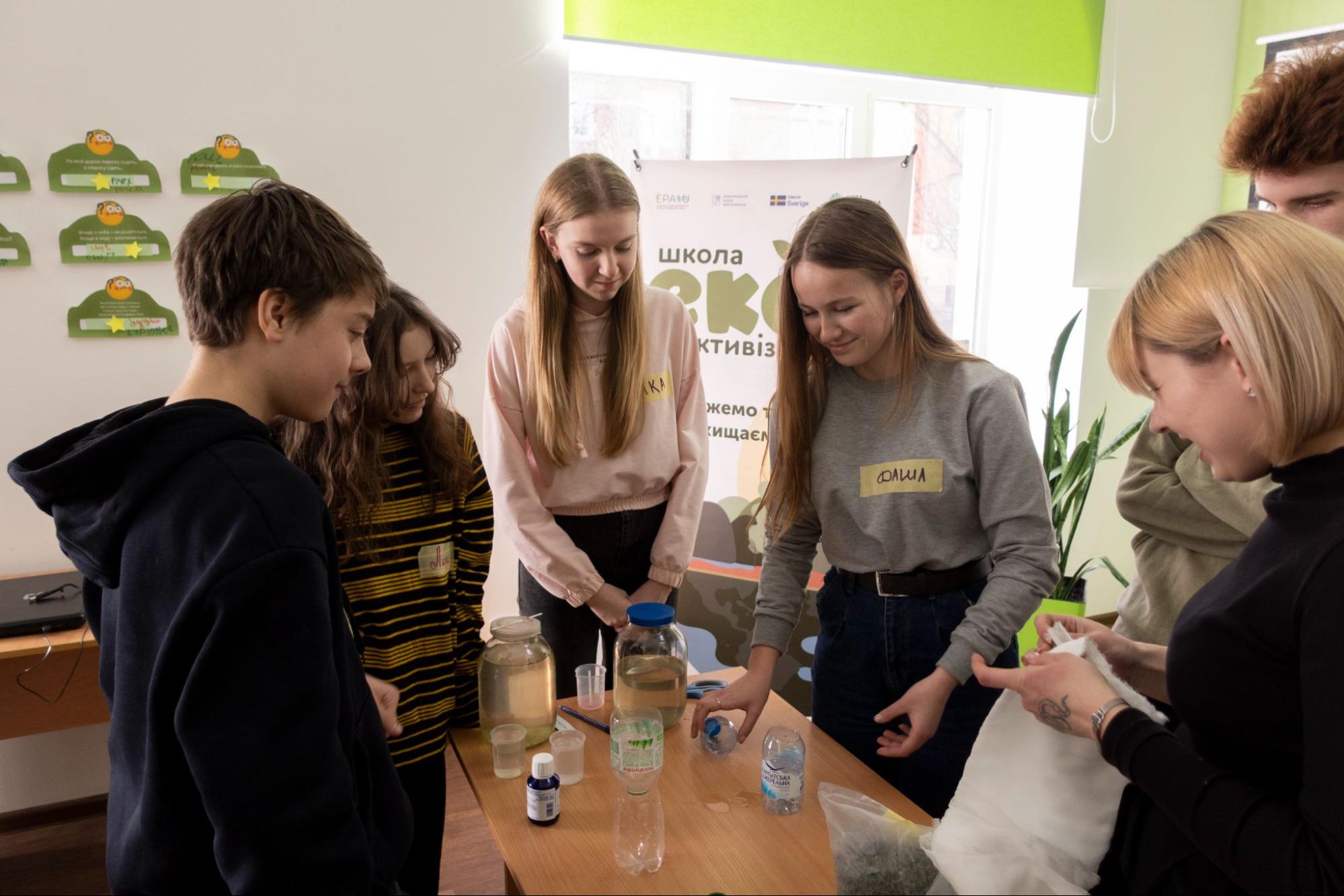
The students conducted water quality testing and created a carbon filter for its purification
The school's participants are still to undergo training on air pollution and project management to learn to apply their knowledge to real-world projects. Young eco-activists will also be introduced to the tools of local democracy and how they can influence the development of the community. Another educational event will be a training on how to achieve the set goals with the help of the game.
"We perfectly understand the importance of cooperating with local authorities, forming a request, and monitoring activities, so we really want to teach this to young people so that later they can change their communities with the help of understanding the available tools," Pavlenko emphasizes.
Become a change driver
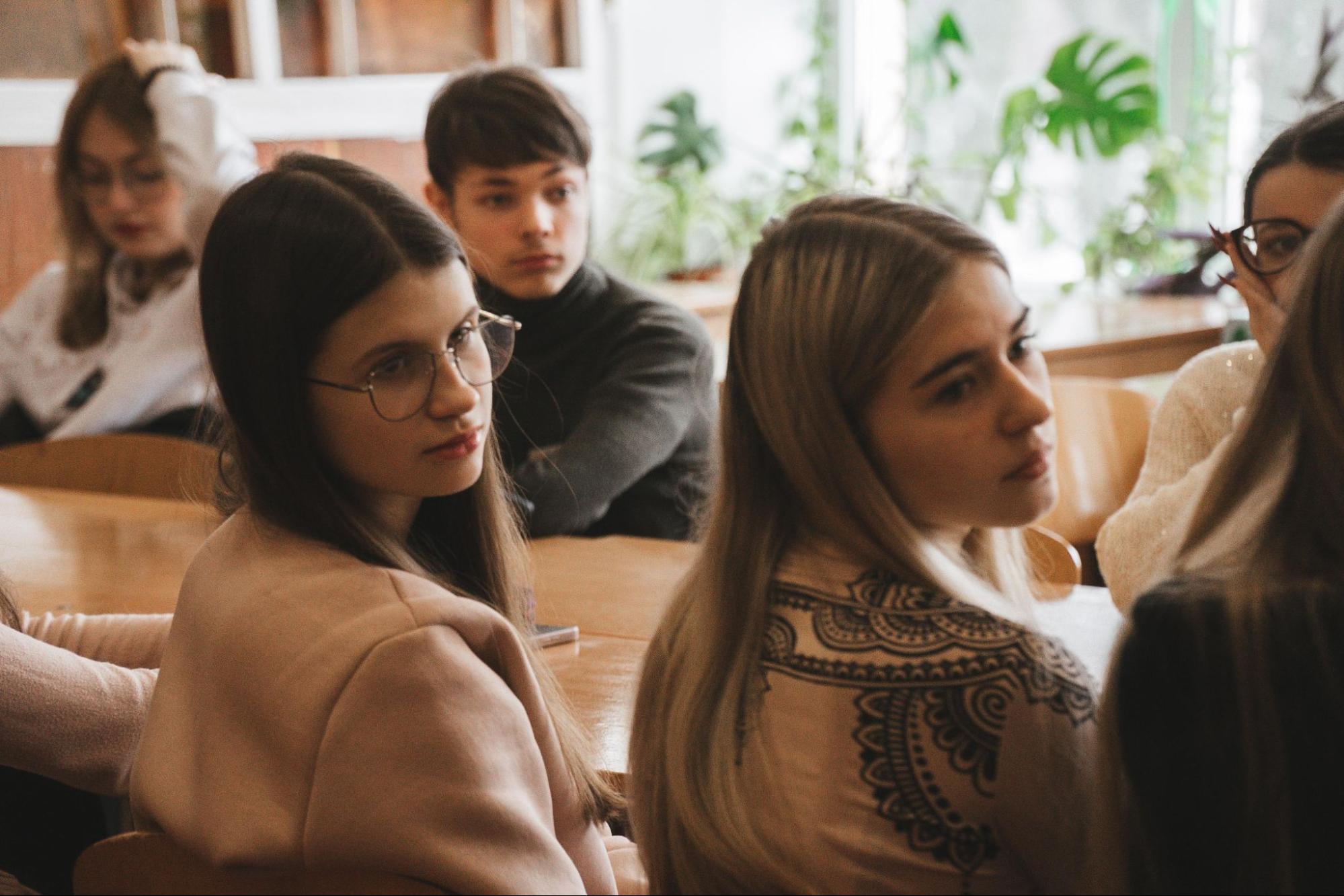
"I am very satisfied with my studies — I learned to express my thoughts on this topic freely and, of course, made new acquaintances," Daria, one of the school's students
Currently, 25 teenagers aged 14 to 17 living in the Znamyanska and Oleksandriyska communities are studying at the School of Eco-Activism, including IDPs from Donetsk, Kherson, and Luhansk regions.
According to Pavlenko, integrating IDPs into communities was one of the project's goals. After the war, some may return to their community and establish the reconstruction process, taking into account ecological needs.
Daria, a student at the school in Oleksandriia, took part in the School of Eco-Activism because she had a great desire to delve into the topic of environmental problems, to learn more about how sorting works, and how to speak publicly about this problem correctly.
"I didn't regret it for a moment, Daria told Rubryka. "I am satisfied that I am spending my time usefully, every training inspires and motivates me to fight environmental problems. After the very first meeting, I had the first changes in my thoughts about ecology. I understood the most important thing — everything starts with each of us. I am very satisfied with my studies — I learned to express my thoughts on this topic freely and, of course, made new acquaintances."

The project aims to build community of environmentally-conscious citizens
Other school students say that they enjoy learning new skills with a simple presentation of information, and, of course, the goodies they are treated to in class.
What's next?

After the end of the training cycle, the school's team and participants plan to conduct "plogging" – a combination of jogging with picking up litter, which merges the Swedish words for "jogga" (jog), and "plocka upp" (pick up). The members of the NGO have already organized such an event in the Donetsk region, in Druzhkivka and Novohrodivka, and saw that people of all age groups are happy to participate in such an event.
Pavlenko also says that after the end of the project, the team will maintain contact with school graduates, follow up on their requests, and develop further cooperation.
"We are sure that at the end of the project, each community will have its own eco-society that will influence the ecological development of Ukraine," Pavlenko says.
Even more useful solutions!
Within the scope of the project, New Druzhkivka introduced waste sorting in three educational institutions of the Kirovohrad region, where participants of the School of Eco-Activism study. Currently, bins for sorting paper and plastic have already been handed over, and together with the participants of the School of Eco-Activism, the NGO is preparing educational events on the topic of sorting garbage for the students of these institutions.
Oleksandriyska and Znamyanska communities residents started collecting batteries as part of the all-Ukrainian movement 'Batteries, surrender!.' Four collection points will allow 40 kilograms of batteries to be sent for ecological processing, saving about 3.2 hectares of land from pollution.
The School of Eco-Activism is a pilot project. After completion, the NGO plans to review what was implemented effectively and what was not, in order to plan projects in other communities. The team is confident they will continue to engage in eco-educational projects.
Pavlenko hopes that, based on the results of the project, the team will be able to form an eco-community, which in the future will expand to all the regions represented by the students of the School of Eco-Activism, and together after Ukraine's victory, will contribute to the ecological reconstruction of the country.
Pavelnko adds that all Druzhkivka residents dream of returning home as soon as possible – but while there is no such opportunity, they will try to build partnerships with non-governmental organizations in the Kirovohrad region, share their experience, develop and improve the cities and villages that sheltered them during the war.
The experience of others
Teaching the new generation the basics of environmental protection is relevant all over the world. Teachers, students and activists find new solutions to include climate and environmental education in the curriculums and everyday life of children and teenagers.
For example, in Boston, Massachusetts, climate education is implemented in schools — in accordance with the new requirements of the state. Organizations such as Eastie Farm, Climate Action Through Education, and Spring Forward work to fill the gaps both in and out of the classroom. Through hands-on learning opportunities, ready-made lesson plans, and youth-led workshops, the organizations aim to improve students' climate literacy in a way that feels relevant to their daily lives.
And in Hawaii, Kamehameha School partners with Native Hawaiian organizations and conducts eco-cultural education programs for students and community members to foster connections between them and the environment. Here, provided with relevant courses, children help restore forests in the territories managed by the school.
Led by Native Hawai'ians, Kamehameha Schools owns thousands of acres of land dedicated to stewardship and conservation. The school partners with Native Hawaiian organizations and conducts eco-cultural education programs for students and members of the community to foster connections between them and the environment.
Newsletter
Digest of the most interesting news: just about the main thing



